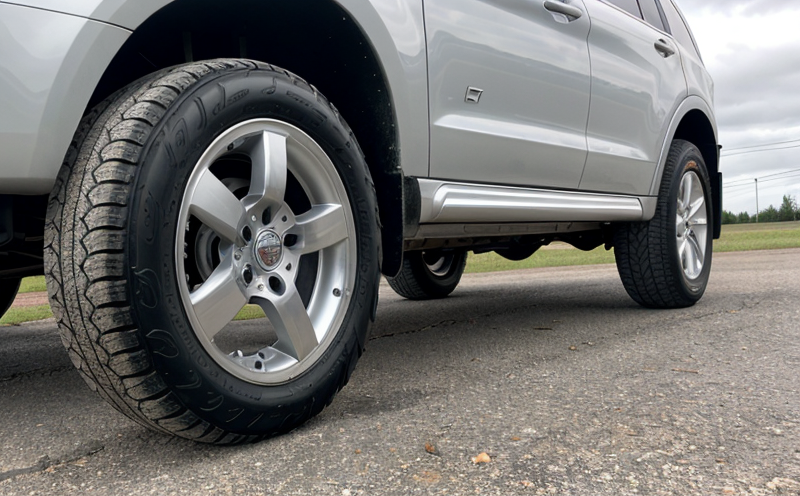EN 13262 Thermal Load Testing of Wheels
The European Standard EN 13262 specifies the methods and procedures for testing the thermal load resistance of railway wheels. This critical test assesses how well a wheel can withstand the heat generated by friction under high loads, ensuring its structural integrity during operation.
Thermal load testing is essential because it simulates real-world operating conditions where the wheel interacts with the rail at high speeds and heavy loads. The primary objective is to evaluate the thermal stability of the wheel material, particularly in areas like the flange, tread, and rim. This ensures that the wheel can dissipate heat efficiently without compromising its mechanical properties.
The test involves subjecting a wheel specimen to a predefined set of load and temperature conditions for an extended period. The specimen is then inspected for any signs of thermal damage or degradation, such as cracks, warping, or changes in material hardness. Compliance with EN 13262 not only ensures the safety and reliability of railway operations but also enhances the overall performance and lifespan of the wheels.
The testing procedure typically involves several stages:
- Specimen preparation: Wheels are carefully selected based on their type, size, and intended use. They undergo thorough cleaning and inspection to ensure they meet the standard's requirements.
- Loading and heating: The wheel is subjected to a specified load and temperature in a controlled environment. The heating cycle simulates the frictional heat generated during operation.
- Inspection: After exposure to thermal stress, the wheel is examined for any signs of damage or changes in performance. This includes visual inspection, dimensional checks, and non-destructive testing methods like ultrasonic testing or X-ray examination.
- Data analysis: The results from the inspection are analyzed to determine if the wheel meets the specified criteria. Compliance with EN 13262 ensures that the wheel can withstand thermal loads without degradation.
The standard's rigorous requirements ensure that railway wheels perform reliably under extreme conditions, enhancing safety and reducing maintenance costs in the long term.
Why It Matters
The importance of thermal load testing cannot be overstated in the railway industry. Ensuring that wheels can withstand extreme temperatures is crucial for maintaining safety, reliability, and operational efficiency. Railway accidents caused by wheel failures are not only catastrophic but also costly in terms of both human lives and economic losses.
Thermal load testing helps identify potential weaknesses in wheel materials early on, allowing manufacturers to address these issues before they lead to significant problems. This proactive approach saves time and resources in the long run, as it prevents costly repairs and replacements that could arise from field failures.
In addition to enhancing safety, thermal load testing also contributes to environmental sustainability by reducing waste. By identifying defects early, rail operators can implement more efficient maintenance schedules, minimizing downtime and energy consumption.
The railway industry is subject to strict international standards like EN 13262, which sets the benchmark for quality and performance. Compliance with these standards not only ensures legal compliance but also builds trust among stakeholders, including passengers, regulatory bodies, and investors.
Benefits
Thermal load testing offers several key benefits:
- Enhanced Safety: Ensures that wheels do not fail due to thermal stress.
- Prolonged Lifespan: Identifies material weaknesses early, optimizing maintenance schedules.
- Compliance with Standards: Meets EN 13262 ensures legal and regulatory compliance.
- Improved Performance: Wheels operate efficiently under high loads and frictional heat.
- Cost Savings: Early identification of defects reduces the need for costly repairs and replacements.
- Environmental Sustainability: Proactive maintenance minimizes waste and energy consumption.
Eurolab Advantages
At Eurolab, we offer comprehensive thermal load testing services tailored to the needs of the railway sector. Our expertise in this area ensures that your wheels meet the strictest international standards:
- Accurate Testing: We use advanced equipment and techniques to simulate real-world conditions accurately.
- Comprehensive Reporting: Our detailed reports provide clear insights into the performance of each wheel specimen.
- Prompt Turnaround Time: We offer fast, reliable testing services to meet your project timelines.
- Expertise: Our team comprises experienced professionals with deep knowledge of railway standards and practices.
- Compliance Assurance: Ensures that all wheels comply with EN 13262 and other relevant international standards.
Partnering with Eurolab means you can trust in our commitment to quality and reliability. We are dedicated to delivering accurate, timely results that meet your specific requirements.
Frequently Asked Questions
- Enhanced safety: Ensures that wheels do not fail due to thermal stress.
- Prolongs wheel lifespan: By identifying material weaknesses early, maintenance can be optimized.
- Compliance with international standards: Meets EN 13262 ensures legal and regulatory compliance.
- Improved performance: Wheels perform optimally under high loads and frictional heat.





